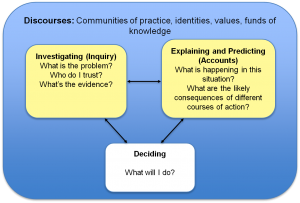Citizenship Research
Citizenship: Teaching Materials Assessments
Citizenship Strand
A basic challenge for science education in a democratic country is preparing citizens to make informed environmental decisions. We define environmental science literacy as the capacity to understand and participate in evidence-based discussions of socio-ecological systems and to make informed decisions about actions and policies. Environmental science literate citizens use science to inform their decisions in both private (e.g., learner, consumer, worker) and public (e.g., voter, advocate) roles. In the Pathways MSP citizenship strand, we are developing a learning progression framework describing changes in understanding and practices from a Lower Anchor (i.e., the informal knowledge and practices that we observe in students when we ask them to think about and make decisions about socio-ecological issues) to an Upper Anchor (i.e., the knowledge and practices individuals need to use science as an effective tool to inform socio-ecological decisions). In our work, we have identified several practices that we believe are fundamental to using science as a tool for citizenship:
• investigating issues,
• explaining and predicting in the material world,
• deciding on courses of action.
We are beginning to understand what the Lower and Upper Anchors for engaging in these practices look like. Our continuing efforts are aimed at further defining levels (including intermediate levels) of proficiency; and envisioning, developing, and testing tools to support students in reaching the Upper Anchor of decision-making practices and knowledge.
For more information contact Beth Covitt (beth.covitt@umontana.edu)
Citizenship Teaching and Professional Development Materials
Publications:
Covitt, B.A., Harris, C.B., and Anderson, C.W. 2013. Evaluating Scientific Arguments with Slow Thinking. Science Scope, Vol. 37, No. 3, p. 44-52. (download)
